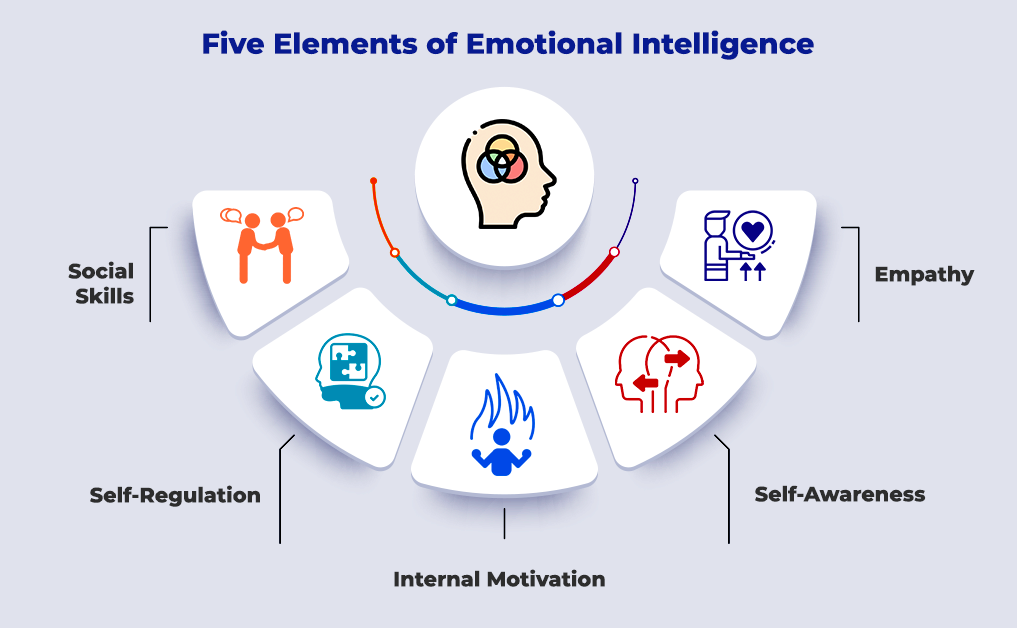Project management has always been one of the ideal gateways for professionals who aspire to be versatile and successful leaders in their careers.
People and processes are two essential components of project management. The key to success here is the ability to understand and organize diverse people and aligning the processes to meet one common goal. Processes could be subjective, but people have always been the core. The essence of people skills in project management is like cheese for pizza. And there is no way to drive people to success without addressing their emotions.
The role of emotions is immense because that’s what sits center of what we think, speak, act and everything else we can do as humans. Mastering emotions is crucial and it is quite challenging sometimes. Having said that, Emotional Intelligence can be the silver bullet to developing and nurturing interconnected relationships and making the best out of them.
What is Emotional Intelligence?
Two psychology professors, John D. Mayer of UNH and Peter Salovey of Yale, first used the phrase in a research study in 1990. Later in 1995, an infamous behavioral scientist and psychologist – Dr Daniel Goleman, wrote a full-fledged book – Emotional Intelligence: Why It Can Matter More Than IQ – a pivotal point for it to become one of the essential personal skills ever.
He described Emotional Intelligence or Emotional Quotient (EQ) as a person’s ability to manage their feelings to express them appropriately and effectively. Besides managing own emotions and feelings, it also demonstrates the ability to recognize, understand and respond constructively to the emotion of others. He considers Emotional Intelligence the most notable causal factor of workplace success.
Out of 33 essential job skills, Emotional Intelligence alone accounts for a staggering 58% of job performance, says Talentsmart.
According to LHH, 75% of managers use Emotional Intelligence to decide on promotions and salary hikes.
What is the need for Emotional Intelligence in Project Management?
As people of multiple personalities come together, diverse emotions will certainly show up and have a fair share of impact on the people’s way of working, workplace relationships and project deliverables. Handling emotions is an essential skill in demand as there are so many key areas, like project resource management, communications management, stakeholder management and much more, that are critical to project success.
Five Elements of Emotional Intelligence
- Self-Awareness
- Self-Regulation
- Internal Motivation
- Empathy
- Social Skills

Let’s learn what these elements really mean and how they could improve project management teams.
Self-awareness
The ability to understand emotions and be conscious of their actions and their impact on others. Self-awareness helps you to know how you feel, how you express and how others perceive you. This essential trait would let you identify your strengths and weaknesses, helping you put up the best version of yourself in your workplace.
Say, you are getting gloomy feedback from your project lead on your performance and it is usual to get dismayed and resist. Instead, acknowledge your emotion and choose to ask them about what you are missing and how you can improve. This is how you stay optimistic irrespective of the nature of the situation.
Self-regulation
It is all about taking control of emotions – staying calm and composed amidst emotionally adverse situations. Having emotional maturity to regulate your feelings gives you the much-needed clarity to make wise decisions rather than impulsive ones.
Are you frustrated because of poor project deliverables? Give yourself a moment before venting it over your peers, and think whether it produces a positive impact. Mostly no, right? It is good to bring a broader perspective and constructively express the scenario, letting them understand the gravity of the issue. This instils accountability and makes them strive to add more value to outcomes.
Internal Motivation
It is a mindset with a vision of committed learning and self-improvement, even though the situations are difficult and emotionally tiring. Internal Motivation drives you to achieve your goals without expecting external credits like rewards and praise. This makes you become a highly productive and goal-oriented professional who gets things done no matter what.
Say, attempt after attempt, you are bogged down with consecutive failures on your project tasks. Here, the way to succeed is to possess a tenacious mindset of becoming the best in what you do. This makes you think past specific down moments and motivates you to accomplish and go one step further to your ultimate goal.
Empathy
Professionals with high EQ are more empathetic. There is no better way to understand others’ emotions than empathizing. When you start seeing things from others’ perspectives, you become highly understanding of their concerns, how they feel, and why they react so.
In a team status call, if a co-worker is continuously given feedback on delayed or unsatisfactory deliverables, try to extend a helping hand that will improve overall teamwork and productivity. If they show signs of burnout or have other challenges, try to understand their perspective and help them bounce back from their situation.
Empathetic team members are not only approachable and active listeners but have the power to evade bias and bring everyone together.
Social Skills
If you are an outgoing personality with good communication skills and are easily approachable, you could find your place at the top of the pack more quickly than the rest. Some remarkable social skills are active listening, building relationships, leadership command and conflict resolution.
If you are a project manager, conflicts are routine and having a healthy relationship with both internal and external stakeholders is crucial. It would be best if you caught the emotional cues of your team members to address their concerns proactively, motivate them whenever necessary and lead a high-performing team.
We have seen how various elements of Emotional Intelligence come together in completing a Project Management Professional. Emotional Intelligence skills sometimes supersede the Technical Skills needed to execute a project effectively. So, let’s capitalize on Emotional Intelligence to win people, make them valuable and inspire them to deliver better outcomes.
Here are a few great ways to nurture emotional intelligence.
-
Reflecting on Each day
Improves your self-awareness and helps you identify what you do, good and bad and where you can improve.
-
Mindful Behaviour
Being aware of your thoughts, emotions, and experiences without judgments and focusing on the present moment.
-
Listening More
Helps develop empathy, enhance communications and building trusted relationships.
-
Understanding non-verbal cues
Improves your understanding of other’s feelings and perspectives, letting you respond more effectively.
-
Feedback sessions
This can give you insights on improving conversations, resolving conflicts, and working collaboratively.
By exploring more EQ and associating traits within a project environment, an organization can experience compelling outcomes like improved stakeholder engagement, healthy team harmony, improved individual contributions and leadership cultivation. At the end of the day, a happy and focused team is all that makes a much-needed positive difference to the customer.






